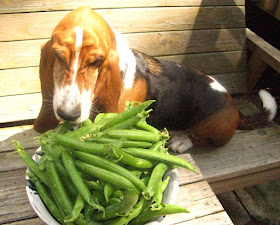 Two big surprises this past weekend at the market were these amazing English peas grown at Rent's Due Ranch and artichokes, also from Rent's Due Ranch. Everything seems so big and luxurious from this farm, I can't help finding lots of great buys every week. Even Finn is impressed by the size of these pods.
Two big surprises this past weekend at the market were these amazing English peas grown at Rent's Due Ranch and artichokes, also from Rent's Due Ranch. Everything seems so big and luxurious from this farm, I can't help finding lots of great buys every week. Even Finn is impressed by the size of these pods. Open a pea pod and the basset hounds will do anything for just one taste, and then another and another. So be sure to buy enough peas to satisfy everyone. At the market, I only loaded up one large bag, but my friend Patty stuffed two big bags. Now I wish I'd gotten more peas and so are the hounds.
Mostly I eat English peas like a snack, right from the pod. One important thing to remember is you must eat peas quickly or they begin to lose sugar, so don't toss them in the produce bin for later in the week and think your peas will taste the same as when they were picked. Fresh English peas are never very sweet when you find them in grocery stores, so visit a farmers' market for these sweet tasting gems. I think JoanE and Mike's secret at Rent's Due is their giant compost pile which is pure black gold for any plants grown there.
To select peas, look for pods that are vibrant green and big with peas. Buy them within a day of picking. Early and mid spring are usually the best times to look for shelling peas in the Northwest.
I never seem to generate recipes for peas because they're so good straight from pod to mouth and they often disappear long before I think about adding them to anything. And the dogs look so pathetic if they don't get just a few peas and then a few more. This week, I actually managed to save a few to add to a rice pilaf.
Another great find this week was artichokes. (Early in May a chef who teaches cooking classes at PCC Natural Markets insisted she was getting baby artichokes from Rent's Due Ranch for her local seasonal cooking classes in May. I don't know what she ended up using for her classes, but the weather is the boss when it comes to seasons and artichokes even in Oregon were late this year.) And since the season for artichokes in Washington is fairly short, hurry and get yours at the U-District market before they're gone. I got four small and two large.
I hate to say it, but no matter how many fancy recipes for artichokes come my way, I still like artichokes best cooked in a pressure cooker and served with lemon and aioli. For the small ones, JoanE says you can eat the entire artichoke, but don't drown them in some fancy sauce, you'll lose the subtle fresh flavor.
Tom usually pressure cooks artichokes at home. If you don't know about pressure cooking and want to try it with artichokes (which can take up to an hour on stove top) start with Lorna Sass's Vegetarian Cooking Under Pressure.
I wrote about artichokes for Marlene's Market and Deli in the July issue of The Sound Outlook where I have new monthly column called Take 5. Bok choy, Celery, Kohlrabi and Turnips are the other vegetables in my new column. Check the July issue of the newspaper on their Web site.
When choosing artichokes look for specimens that feel firm and have tight leaves. I like the big ones, but the little artichokes are so tender you can just peel some of the outer leaves off and eat the entire artichoke when cooked. I love to dip artichokes in a mixture of lemon juice and aioli with a little coarse sea salt and freshly ground pepper.
I've been wondering how to work Rockridge Orchards Apple Cider into an artichoke recipe. Maybe I'll try braising the little artichokes in it today. And this coming 4th of July weekend, maybe I'll try grilling a few artichokes.
